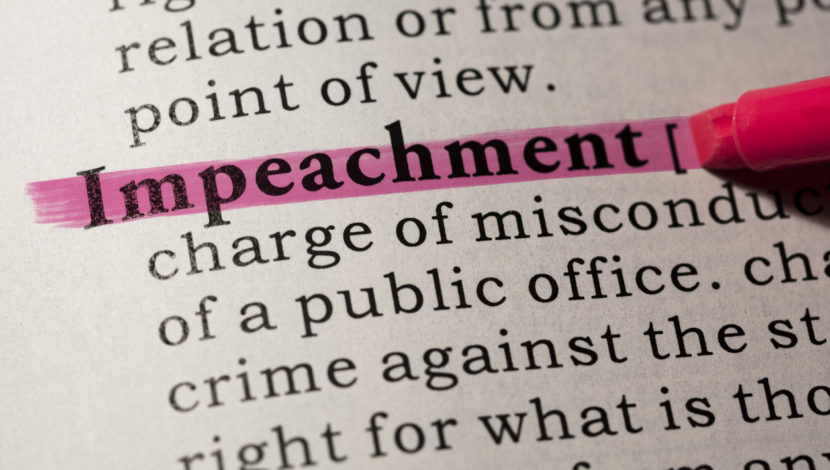The Unitarian Universalist Service Committee advances human rights through grassroots collaborations.
3 Reasons Why the Senate Should Convict Donald Trump

By on February 9, 2021
This week, the trial of Donald J. Trump begins in the U.S. Senate. The House of Representatives already voted on January 13 to impeach the former president, meaning that Trump bears the ignoble distinction of being the first U.S. president in history to be impeached twice. The articles of impeachment now reach the Senate, which must decide whether to: 1) convict the former president; and 2) bar Donald Trump from ever holding an office of public trust and honor again.
We urge Senators to vote yes on both counts, and we invite readers to add their voices to this call for accountability. We do not make the decision to support such measures lightly. Impeachment, removal from office, or a permanent bar on future public service are grave sanctions that should be reserved only for the most severe misconduct. However, we believe that Donald Trump’s behavior in office rises to the level of the “high crimes and misdemeanors” the Constitution forbids for federal officials. We take this position for the following reasons, among others:
1. Trump’s actions in his final months in office constituted a deliberate attempt to subvert a democratic election and undermine the U.S. Constitution.
While Donald Trump’s actions on January 6 were particularly abhorrent, they were a culmination of earlier patterns of behavior that were long apparent. Trump’s contempt for legal norms and the rights of others was evident from his earliest racist remarks on the campaign trail in 2015, his calls for blatantly discriminatory travel bans affecting Muslim immigrants and refugees, his repeated shutdown of the asylum system, his praise of torture and police brutality, and his many other other appalling comments and actions.
After it became clear that Joe Biden and Kamala Harris were the legitimate winners of the 2020 presidential election, based on certified vote totals from all 50 states, these patterns of destructive behavior and dangerous rhetoric found a new target: U.S. constitutional democracy itself. Over the course of months, Donald Trump mounted a multi-pronged effort to discredit this process and overturn the results of the election.
As time went on, Trump employed increasingly brazen—and possibly criminal—means to achieve this goal, including pressuring a state elections official to report fraudulent results, meeting with state lawmakers behind closed doors to try to interfere with the certification of the votes in Michigan, consulting with associates on the possibility of invoking the Insurrection Act to halt Biden’s inauguration, and openly urging the Vice President to violate the Constitution by refusing to certify the results of the Electoral College tally.
Informed by more than 80 years of human rights work around the world, we can say that there are few greater dangers to democracy than an executive who refuses to accept the results of a legitimate election. Trying to subvert these results and interfere with the peaceful transfer of power are the hallmarks of authoritarianism. We are fortunate to have survived such an attempt in this instance. To fail to hold the guilty party responsible after the fact, and to allow him to seek public office again would invite future attacks on our democracy.
2. Trump’s “First Amendment” defense of his remarks shortly before the January 6 attack is not credible.
Donald Trump’s January 6 speech in front of the U.S. Capitol invited the possibility of violence and directly inspired the subsequent attack (including by implying that congresspeople and members of his own administration should be afraid for their safety if they followed the Constitutional process of certifying the election). That does not mean that Trump could be convicted in a typical criminal trial on the basis of these remarks alone; indeed, his comments would most likely be shielded by the First Amendment, if this were an ordinary criminal proceeding.
However, a trial in the Senate on articles of impeachment is not an ordinary criminal proceeding; it applies a different and more exacting standard in determining whether a given person is entitled to hold offices of public trust. For this reason, the Constitution explicitly states that Senate impeachment trials cannot impose any criminal penalties, or any other sanctions exceeding removal from office and a bar on holding office again.
In order to deserve to hold or seek public office, a president needs to do more than just adhere to the letter of the law. They must also honor their oath of office to defend the U.S. Constitution. Donald Trump might not be criminally liable for his speech on January 6; but he nevertheless can and should be convicted and barred from holding office for trying to violate the Constitution and overthrow a democratic election. His legal team’s argument that the First Amendment shields him from conviction on the articles of impeachment is therefore irrelevant and without merit.
3. A failure to hold Trump accountable would set a dangerous example for populist demagogues, authoritarians, and would-be autocratic rulers the world over.
As of this writing, a coup is taking place in Burma (Myanmar), where UUSC has worked for more than 25 years. The Burmese military, or Tatmadaw—unhappy with the results of an election in which they won few seats—used spurious claims of electoral “fraud” to subvert the results of the November election, jail Burma’s civilian leader, and overthrow the country’s elected government. This is only one example of several places in the world that have seen illegal coups in recent years—another being Honduras, where a U.S.-backed operation in 2009 unseated the democratically elected president Manuel Zelaya.
The U.S. government has spoken out against the coup in Burma and refused to recognize the military regime that is seizing power—which the United States failed to do in Honduras in 2009, to disastrous effect. We applaud the Biden administration for condemning the Burmese military’s blatantly unlawful act.
However, the United States will lose all credibility in denouncing anti-democratic actions in other countries if it refuses to sanction and forbid an attempt to overthrow the legitimate government in its own borders. If a U.S. president can try to subvert an election with impunity, then the United States will not only be unable to convincingly defend or promote democracy and human rights abroad, we will also present a model for corruption and illegality that dictators and authoritarians the world over—such as the genocidal leaders of the Burmese Tatmadaw—would be only too pleased to emulate.
In his remarks on Inauguration Day, 2021, President Joe Biden urged the U.S. government to lead not by the “example of our power,” but by “the power of our example.” We cannot do this as a nation if we fail to hold Donald Trump accountable for his prolonged and systematic effort to subvert our democratic process. To hope to be a beacon for any other countries—or indeed for future generations of Americans—we must uphold the rule of law and the principles of accountability in our actions at home. For these reasons, we reiterate our call to the Senate to convict Donald Trump and bar him from ever holding public office again. And we urge everyone reading this post to join us in this effort, so that we may defend and restore the rule of law in our nation.
***
About UUSC: Guided by the belief that all people have inherent worth and dignity, UUSC advances human rights globally by partnering with affected communities who are confronting injustice, mobilizing to challenge oppressive systems, and inspiring and sustaining spiritually grounded activism for justice. We invite you to join us in this journey toward realizing a better future!
Image Credit: iStock – Devonyu

